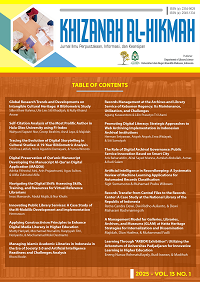A Management Model for Galleries, Libraries, Archives, and Museums (GLAM) at Hatta Heritage
Strategies for Internalization and Dissemination
DOI:
https://doi.org/10.24252/v13i1a14Keywords:
GLAM (Galleries, Libraries, Archives, Museums), Cultural Heritage Management, Hatta Heritage, Knowledge ManagementAbstract
This research aims to develop an integrated management model designed explicitly for the Galleries, Libraries, Archives, and Museums (GLAM) sector to enhance the dissemination of information related to Proclamatory Bung Hatta. This study adopts a qualitative approach. Data were collected through interviews, observations, and literature reviews to understand the research topic comprehensively. Key informants included librarians, museum managers, curators, and information users, whose perspectives provided valuable insights into the dynamics of information utilization. The research was conducted in Bukittinggi City, considering Bung Hatta's hometown, as there are several GLAM institutions related to Bung Hatta in Bukittinggi City. The findings were then synthesized into a conceptual model. The findings of this study led to the development of an information packaging model tailored to the needs of the Bung Hatta collection. The model consists of several key stages: identifying relevant content, choosing the most suitable formats, reprocessing the information to suit user needs, organizing it in a coherent structure, and finally, disseminating it effectively. Each stage is designed to ensure that the values and messages embedded in the collection can be more easily understood, appreciated, and accessed by a wider audience.
Downloads
References
Al-Hakim, L. (2007). Information quality management : theory and applications. Idea Group Pub.
Avdikos, V., Dragouni, M., Michailidou, M., & Pettas, D. (2023). Rethinking GLAMs as commons: a conceptual framework. Open Research Europe, 3, 157. https://doi.org/10.12688/openreseurope.16473.1
Dongardive, P. (2013). Information repackaging in library services. International Journal of Science and Research (IJSR), 2(11), 204–209.
Eppler, M. J., & Mengis, J. (2004). The concept of information overload: A review of literature from organization science, accounting, marketing, MIS, and related disciplines. In Information Society (Vol. 20, Issue 5, pp. 325–344). https://doi.org/10.1080/01972240490507974
Heylighen, F. (2002). Complexity and Information Overload in Society: why increasing efficiency leads to decreasing control. http://pcp.vub.ac.be/HEYL.html
Izuchukwu, C. (2024). Information Repackaging For Information Users. IOSR Journal Of Humanities And Social Science (IOSR-JHSS), 29, 49–55. https://doi.org/10.9790/0837-2906114955
Jackson, T. W., & Lichtenstein, S. (2011). Optimising e-mail communication: the impact of seminar-and computer-based training. In Int. J. Internet and Enterprise Management.
Kusi, G. A., Zannatul, M., Rumki, A., Quarcoo, F. H., Otchere, E., & Fu, G. (2022). Journal of Business and Management Studies The Role of Information Overload on Consumers’ Online Shopping Behavior. https://doi.org/10.32996/jbms
Lammers, J. C., & Garcia, M. A. (2017). Institutional Theory Approaches. In The International Encyclopedia of Organizational Communication (pp. 1–10). Wiley. https://doi.org/10.1002/9781118955567.wbieoc113
Logan, M. A., & Liew, C. L. (2023). GLAM Convergence Revisited: An Examination of User Perception and Experience. Journal of Library Administration, 63(8), 1014–1043. https://doi.org/10.1080/01930826.2023.2281340
Loulanski, T. (2006). Revising the Concept for Cultural Heritage: The Argument for a Functional Approach. International Journal of Cultural Property, 13(2), 207–233. https://doi.org/10.1017/S0940739106060085
Miller, G. A. (n.d.). The Magical Number Seven, Plus or Minus Two: Some Limits on our Capacity for Processing Information[1]. http://psychclassics.yorku.ca/Miller/
Downloads
Published
How to Cite
Issue
Section
License
Copyright (c) 2025 Muhammad Fadli, Majidah, Majidah, Dian Hasfera

This work is licensed under a Creative Commons Attribution-NonCommercial-ShareAlike 4.0 International License.
By submitting your manuscript to our journal, you are following Copyright and License



